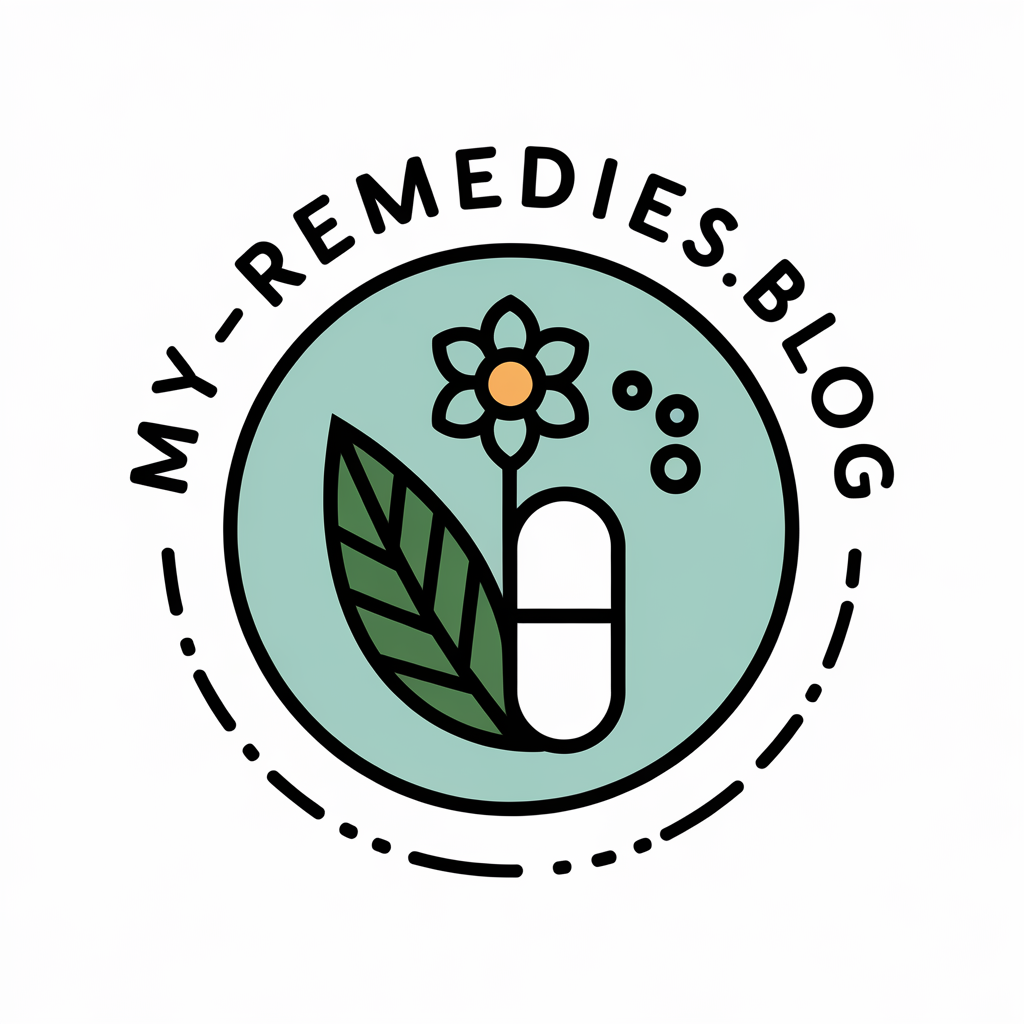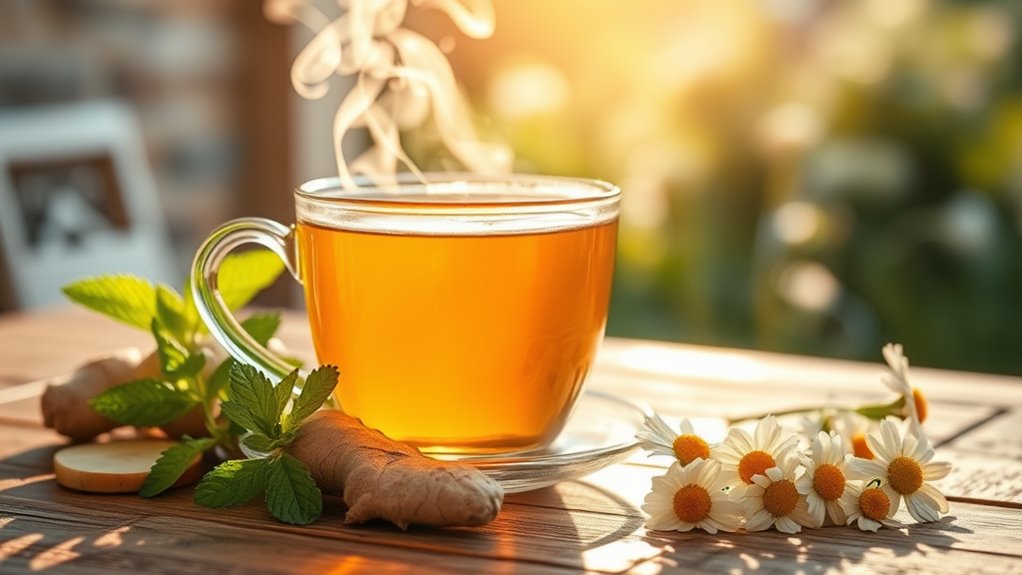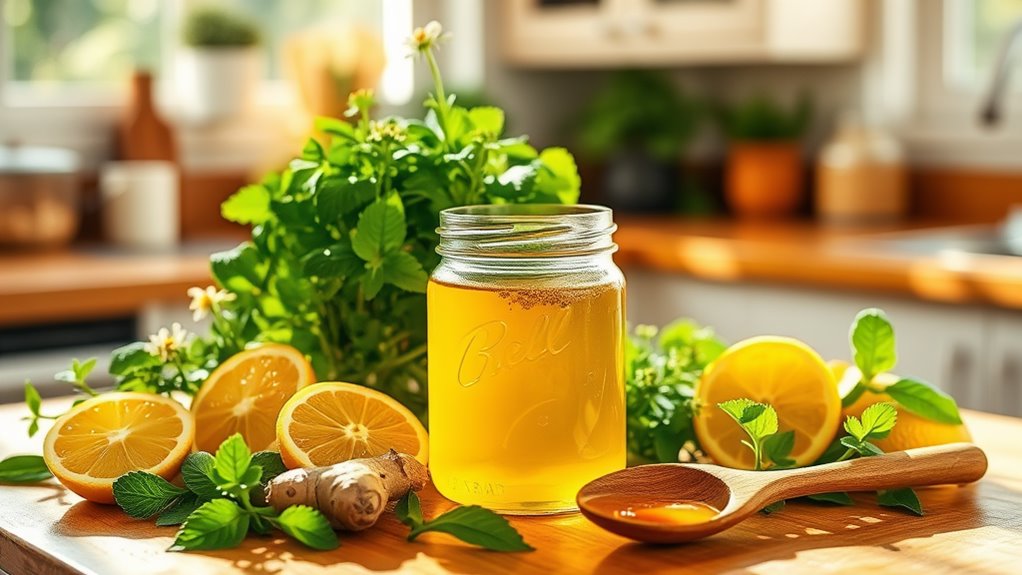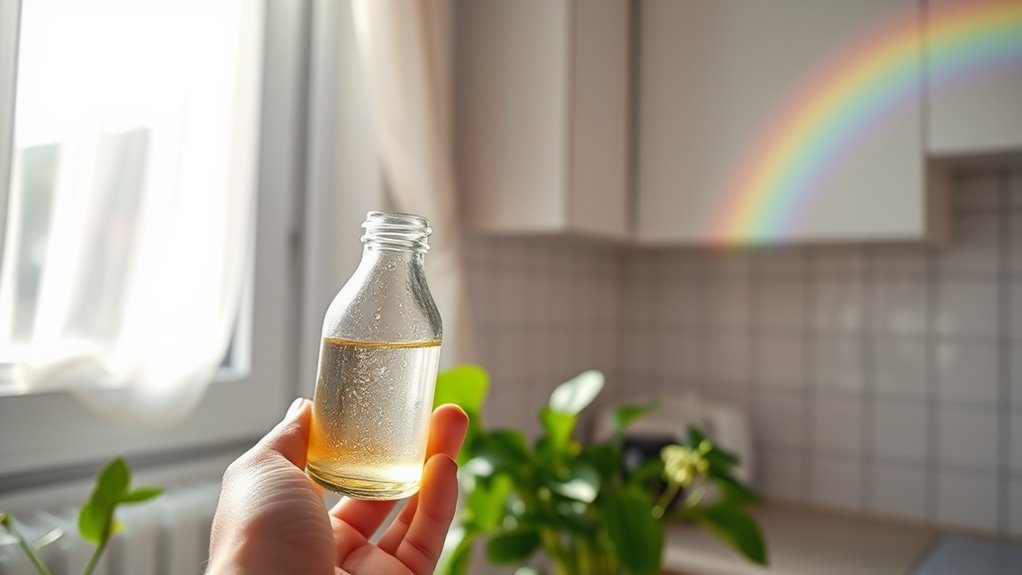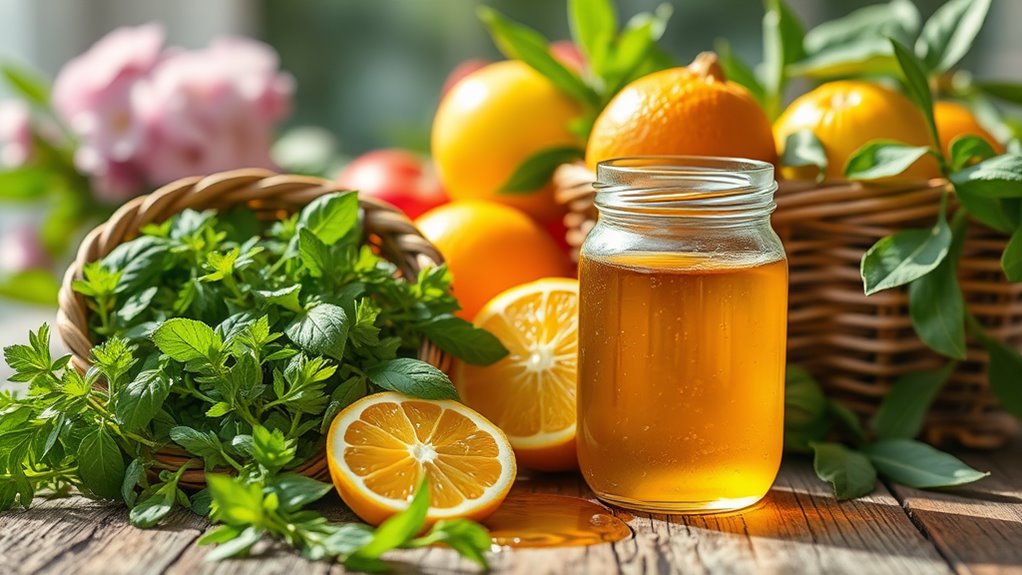Quick Allergy Relief With This Tea Blend Anyone Can Make
If you’re looking for quick allergy relief, try this simple herbal tea blend. Combine chamomile for inflammation, peppermint as a decongestant, and nettle for its antihistamine properties. Steep these ingredients in hot water, and sweeten with honey for an extra boost. This soothing tea not only alleviates symptoms but also creates a calming ritual. Want to enhance your tea’s effectiveness and discover more tips? There’s plenty more to explore about natural allergy management!
Key Takeaways
- Brew a blend of chamomile, peppermint, and nettle for natural antihistamine effects and soothing relief from allergy symptoms.
- Add ginger to your tea for anti-inflammatory benefits that can help reduce discomfort associated with allergies.
- Enhance your tea with a drop of peppermint or eucalyptus essential oil for improved respiratory relief and decongestion.
- Sweeten your blend with honey or maple syrup for added flavor and natural health benefits.
- Regularly drink this herbal tea during allergy season to help manage and alleviate symptoms effectively.
Understanding Allergies and Their Symptoms
Allergies can spring up unexpectedly, leaving you feeling uncomfortable and frustrated. They occur when your immune system overreacts to harmless substances, like pollen, dust, or certain foods. Common symptoms include sneezing, itching, runny nose, and even skin rashes.
You might also experience headaches or fatigue, making daily activities more challenging. Understanding these symptoms is essential for managing your allergies effectively. Identifying triggers helps you avoid them, and knowing how your body reacts can lead you to seek relief. Identifying triggers is essential for effective management and relief.
Many people turn to natural remedies, such as herbal tea for allergies, to soothe their symptoms. Ingredients like chamomile and peppermint can provide gentle support, allowing you to breathe easier and feel more comfortable while maneuvering through allergy season. Additionally, maintaining a healthy lifestyle can significantly enhance your immune response to allergens.
The Benefits of Herbal Tea for Allergy Relief
Herbal tea can be a powerful ally in managing allergy symptoms.
Many herbs act as natural antihistamines, helping to reduce your body’s reaction to allergens.
Plus, the soothing warmth of a steaming cup can provide comfort and relief when you’re feeling under the weather.
Natural Antihistamine Properties
While the onset of allergy season can be frustrating, turning to herbal tea may offer a soothing solution thanks to its natural antihistamine properties. Many herbs contain compounds that help reduce histamine release, providing relief from sneezing and congestion. Here’s a quick guide to some effective herbs:
| Herb | Antihistamine Properties | Preparation Tips |
|---|---|---|
| Nettle | Reduces inflammation and itching | Steep leaves for 10 minutes |
| Peppermint | Opens airways and eases throat | Brew with fresh or dried leaves |
| Ginger | Fights inflammation | Slice and steep in hot water |
| Chamomile | Calms and reduces swelling | Use tea bags or loose flowers |
| Lemon Balm | Alleviates stress and allergies | Infuse fresh leaves |
Try incorporating these herbs into your tea routine for natural relief!
Soothing Effects on Symptoms
When seasonal irritants strike, sipping on a warm cup of tea can be a comforting way to ease your symptoms.
Herbal teas, like chamomile and peppermint, have natural anti-inflammatory properties that can soothe your throat and reduce congestion. The warmth of the tea not only hydrates you but also helps open nasal passages, allowing you to breathe easier.
Additionally, certain blends with ginger or turmeric may also help combat inflammation and promote overall wellness.
You’ll find that the ritual of brewing and sipping tea can be calming, providing a moment of peace amid allergy chaos.
Key Ingredients for Your Allergy Relief Tea Blend
When crafting your allergy relief tea blend, you’ll want to focus on the right ingredients that pack a powerful punch.
Herbal powerhouses can help clear your sinuses, while essential oils add extra benefits to soothe your symptoms.
Don’t forget to take into account sweeteners for flavor—after all, a tasty tea is more likely to become a go-to remedy!
Herbal Powerhouses Explained
Creating an effective allergy relief tea blend involves harnessing the power of key herbal ingredients that can alleviate symptoms and support your immune system.
First up is chamomile, known for its anti-inflammatory properties, which can help soothe irritated nasal passages.
Next, peppermint offers a revitalizing flavor while acting as a natural decongestant, making it easier to breathe.
Nettle is another powerhouse; its antihistamine effects can combat allergy symptoms effectively.
Don’t overlook ginger, which provides additional anti-inflammatory benefits and helps with digestion.
Finally, lemon balm can calm your nerves while boosting your mood.
Combine these herbs to create a delicious tea that not only tastes great but also provides the relief you need during allergy season.
Enjoy your soothing cup!
Essential Oils Benefits
Incorporating essential oils into your allergy relief tea blend can markedly enhance its effectiveness and overall experience.
These concentrated plant extracts offer powerful benefits that can soothe your allergies. For instance, peppermint oil can help clear nasal passages and ease congestion, while eucalyptus oil has anti-inflammatory properties that may reduce swelling in your sinuses.
Lavender oil not only promotes relaxation but also acts as a natural antihistamine, helping to calm your immune response. Just a few drops of these oils can elevate your tea, making it more potent against allergy symptoms.
Remember to use essential oils sparingly and choose high-quality, food-grade options for the best results. Let these aromatic additions transform your tea into a healing elixir!
Sweeteners for Flavor
While essential oils can boost the effectiveness of your allergy relief tea, the right sweeteners can enhance its flavor and make it more enjoyable to drink. Choosing a sweetener that complements your blend can elevate the experience. Here are some great options:
| Sweetener | Flavor Profile | Benefits |
|---|---|---|
| Honey | Floral, rich | Natural antibacterial |
| Maple Syrup | Earthy, warm | Antioxidant properties |
| Stevia | Sweet, herbal | Zero calories, diabetic-friendly |
| Agave Nectar | Mild, caramel-like | Low glycemic index |
| Coconut Sugar | Caramel, nutty | Contains minerals |
Experiment with these sweeteners to find the perfect balance for your allergy relief tea, making it not just effective but also delicious!
Step-by-Step Guide to Making the Tea Blend
To craft your own allergy relief tea blend, you’ll need to gather a few key ingredients that work harmoniously to soothe your symptoms.
Start with a base of green tea or chamomile, both known for their anti-inflammatory properties. Next, add dried nettle leaves, which can help reduce histamine levels. Incorporate peppermint for its invigorating flavor and ability to clear nasal passages. If you like a bit of sweetness, toss in some honey or agave syrup. Local honey may help the body adapt to local pollen in your area.
Once you have your ingredients, boil water and steep your mixture for about 5-7 minutes. Strain the tea into your favorite cup, and enjoy it warm.
This simple blend can provide quick relief when allergies strike, making it a go-to remedy for your wellness routine.
How to Customize Your Tea for Maximum Effectiveness
Customizing your allergy relief tea blend can enhance its effectiveness and tailor it to your specific needs. Start by selecting herbs and ingredients that target your symptoms. For instance, if you’re battling congestion, consider adding peppermint or eucalyptus. If you need a boost in immunity, ginger or echinacea could be beneficial.
Here’s a quick reference table to help you choose the right ingredients:
| Symptom | Suggested Ingredients |
|---|---|
| Congestion | Peppermint, Eucalyptus |
| Sneezing | Chamomile, Nettle |
| Itchy Eyes | Green Tea, Rooibos |
| Inflammation | Ginger, Turmeric |
Experiment with different combinations to find what works best for you, and enjoy your personalized tea experience!
Additional Tips for Managing Allergies Naturally
Managing allergies naturally involves a combination of lifestyle adjustments and mindful practices that can greatly alleviate symptoms. Here are some effective tips to incorporate into your daily routine:
-
Stay Hydrated: Drinking plenty of water helps thin mucus and keeps your airways clear.
-
Limit Indoor Allergens: Regularly clean your home and use air purifiers to reduce dust and pet dander.
-
Practice Mindfulness: Techniques like yoga and meditation can reduce stress, which may worsen allergy symptoms.
-
Eat a Balanced Diet: Incorporate anti-inflammatory foods, such as fruits and vegetables, to support your immune system.
When to Seek Professional Help for Allergies
If you notice that your allergy symptoms persist despite trying various home remedies, it might be time to consult a healthcare professional.
Don’t ignore signs like difficulty breathing, chest tightness, or swelling in your face or throat. These symptoms can indicate a more serious allergic reaction that requires immediate attention.
Additionally, if you’re experiencing frequent headaches, fatigue, or skin reactions that don’t improve, seeking help can provide you with a clearer diagnosis and tailored treatment plan.
An allergist can conduct tests to identify specific allergens and prescribe appropriate medications.
Remember, your health is important, and getting professional guidance can help you manage your allergies effectively and improve your quality of life.
Don’t hesitate to reach out for help when you need it!
